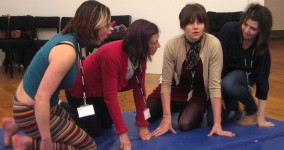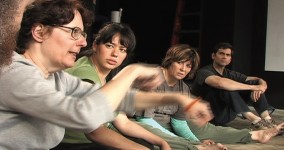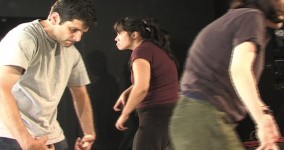


The class description ran: “This performative workshop explores primate communication and social organization and leads to a videotaped nature documentary, part of the Primate Cinema series. Participants will watch video clips of animal behavior in the wild and in cinema, learn about primatology, and engage in physical theater techniques and improvisation.”
I organized and led the workshop with Deborah Forster, a cognitive scientist who has worked with primates at the San Diego Zoo and has studied wild baboons in Kenya, and Alyssa Ravenwood, a physical theater director and mask maker. Participants included an engineer, a playwright and zoo volunteer, a full time stage actor, and others with an interest in performance and animals.
Contorting their bodies to move like quadrupeds, the workshop participants tried and failed to live in a different type of anatomy. Attempting to communicate without words, they saw instant commonalities with other primates in what is expressed with bodies and eyes. Theater exercises, like play behavior in other primates, seemed the perfect context for learning about social life. As the behaviorist Marc Bekoff notes, play is the forum in which all sorts of animals learn their roles, and are forgiven for their transgressions.
The workshop led to a lot of interesting discussions about primate societies, how much can actually be known—scientifically or intuitively—about what it means to be a baboon, a chimpanzee, or a bonobo. Forster discussed how primatologists both strategically distance themselves from the animals they observe, and at the same time, how primatologists have come back around to empathy as a means of understanding animals’ motivations and interior worlds. The group wondered how primatologists’ techniques for objectively observing other primates would work on themselves. The participants looked at how movies have biased primatologists and nonscientists alike; from the influence of World War II films, film noir, and primate science. Viewing Kiss Me Deadly one week, workshoppers saw human nature as patriarchal and aggressive, peopled by femme fatales and sociopaths; another week when viewing March of the Penguins, humans appear noble, altruistic, and moral.
This “How to Act like an Animal” workshop resulted in a video of the same name. In the video, workshop participants in Los Angeles reenact a clip from a wildlife documentary. The clip depicts chimpanzees hunting a red colobus monkey and then eating the meat. The clip is excerpted from the 1995 National Geographic documentary The New Chimpanzees that was shot at Jane Goodall’s research site in Gombe, Tanzania, and features the community she researched for over thirty years. In the video, the documentary sequence plays through three times on one channel, while the performers are seen acting in real time in relation to the footage on a second channel. The first loop shows the workshop actors watching the monitor showing the clip. The second time through, the actors have been directed to simply “act like the chimpanzees.” In the third instance, actors are assigned roles of individual chimps, and the video is edited shot by shot.
I compiled a description of the first workshop in Los Angeles as an invitation for others to participate in a second workshop in Manchester, England. Whether or not they read the description below, fourteen brave people participated in the Mancunian version of the “How to Act like an Animal” workshop in February 2009.







